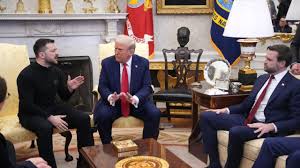The Tense White House Meeting: Trump’s Ultimatum to Zelensky
In a tense and dramatic White House meeting, former President Donald Trump delivered a blunt ultimatum to Ukrainian President Volodymyr Zelensky: "Make a deal or we're out." This blog post delves into the high-stakes encounter, exploring the historical tensions between the U.S. and Ukraine, the implications of Trump's demand, and what it means for the future of U.S. foreign policy.
POLITICS


Trump to Zelensky: "Make a Deal or We're Out" – A Tense White House Meeting Reveals Deepening Strains in U.S.-Ukraine Relations
In a dramatic and reportedly heated meeting at the White House, former President Donald Trump delivered a blunt ultimatum to Ukrainian President Volodymyr Zelensky: "Make a deal or we're out." The encounter, which took place behind closed doors, has sparked widespread speculation about the future of U.S.-Ukraine relations and the broader geopolitical implications of such a stark demand.
The Context: A History of Tension
The relationship between the United States and Ukraine has been fraught with tension in recent years, particularly during Trump's presidency. The infamous 2019 phone call between Trump and Zelensky, which led to Trump's first impeachment, centered on allegations that Trump had pressured Ukraine to investigate his political rival, Joe Biden, in exchange for military aid. While Trump was acquitted by the Senate, the incident left a lasting mark on U.S.-Ukraine relations.
Fast forward to the present, and the stakes are even higher. Ukraine remains locked in a protracted conflict with Russia, which annexed Crimea in 2014 and continues to support separatist movements in eastern Ukraine. The U.S. has been a critical ally, providing military aid, economic support, and diplomatic backing to Ukraine. However, Trump's latest remarks suggest a potential shift in American policy, one that could have far-reaching consequences.
The Meeting: A Clash of Priorities
According to sources familiar with the meeting, Trump's message to Zelensky was unequivocal: Ukraine needs to negotiate a deal with Russia to end the conflict, or risk losing U.S. support. Trump reportedly expressed frustration with the ongoing stalemate and the financial burden of continued American involvement. "We can't keep doing this forever," Trump is said to have told Zelensky. "You need to make a deal, or we're out."
For Zelensky, the demand presents a difficult dilemma. On one hand, ending the conflict is a top priority for Ukraine, but on the other, any deal with Russia would likely require significant concessions, potentially undermining Ukraine's sovereignty and territorial integrity. Zelensky, who campaigned on a platform of peace and reform, now finds himself caught between the geopolitical ambitions of two global powers.
The Implications: A Shifting Alliance?
Trump's ultimatum raises serious questions about the future of U.S.-Ukraine relations. If the U.S. were to withdraw its support, it could embolden Russia and weaken Ukraine's position in the conflict. It could also signal a broader shift in American foreign policy, one that prioritizes disengagement and deal-making over traditional alliances and commitments.
Critics argue that Trump's approach risks undermining decades of U.S. efforts to promote democracy and stability in Eastern Europe. They warn that abandoning Ukraine could have a domino effect, encouraging other authoritarian regimes to challenge the international order. Supporters, however, contend that Trump's focus on ending conflicts and reducing American involvement abroad is a necessary correction to decades of overreach.
The Global Reaction
The international community has been quick to react to the news of the meeting. European leaders, many of whom have been wary of Trump's "America First" policies, have expressed concern about the potential consequences of a U.S. withdrawal from Ukraine. NATO officials have reiterated their commitment to Ukraine's sovereignty, but without American support, the alliance's ability to project power in the region could be severely diminished.
In Russia, the reaction has been more muted, with some officials cautiously welcoming the prospect of a negotiated settlement. However, there is also skepticism about whether Trump's demands will lead to any meaningful progress, given the deep-seated animosity between Ukraine and Russia.
What’s Next for Ukraine?
For Ukraine, the path forward is fraught with uncertainty. Zelensky must navigate the delicate balance between maintaining domestic support, securing international backing, and addressing the realities of the conflict with Russia. The prospect of losing U.S. support adds another layer of complexity to an already challenging situation.
Some analysts suggest that Zelensky may seek to strengthen ties with other Western allies, such as the European Union, to offset any potential reduction in American aid. Others believe that Ukraine may have no choice but to engage in serious negotiations with Russia, despite the risks.
A Turning Point in U.S. Foreign Policy?
Trump's ultimatum to Zelensky is more than just a bilateral issue—it reflects a broader shift in American foreign policy under his administration. By prioritizing deal-making over traditional alliances, Trump is challenging the status quo and redefining America's role in the world. Whether this approach will lead to lasting peace and stability, or further instability and conflict, remains to be seen.
As the world watches and waits, one thing is clear: the outcome of this high-stakes diplomatic showdown will have profound implications for Ukraine, the United States, and the global order.
What are your thoughts on Trump's ultimatum to Zelensky? Do you think the U.S. should continue to support Ukraine, or is it time to push for a deal with Russia? Share your opinions in the comments below.

